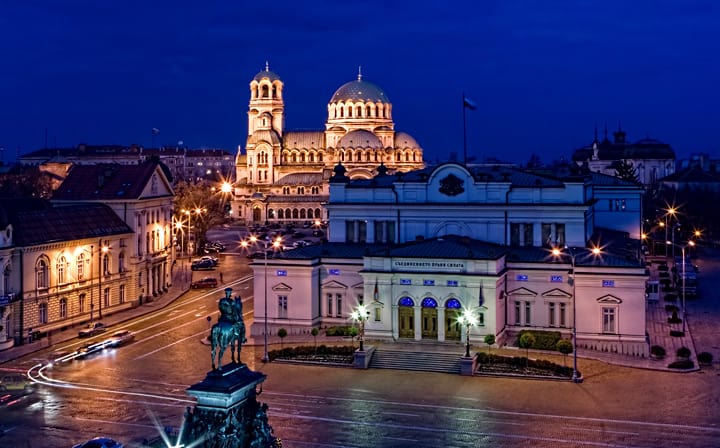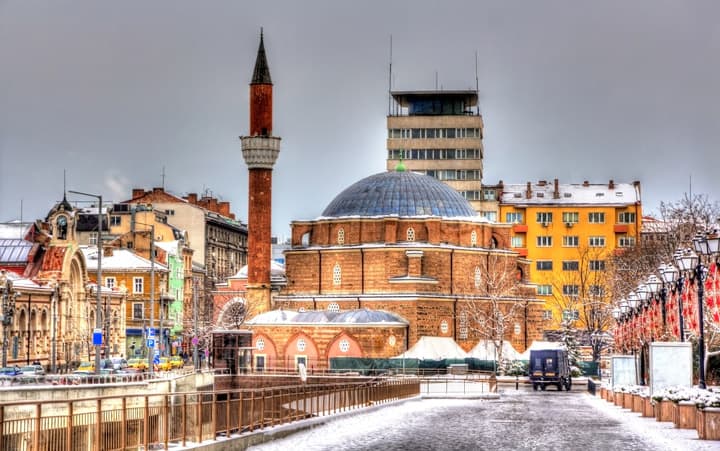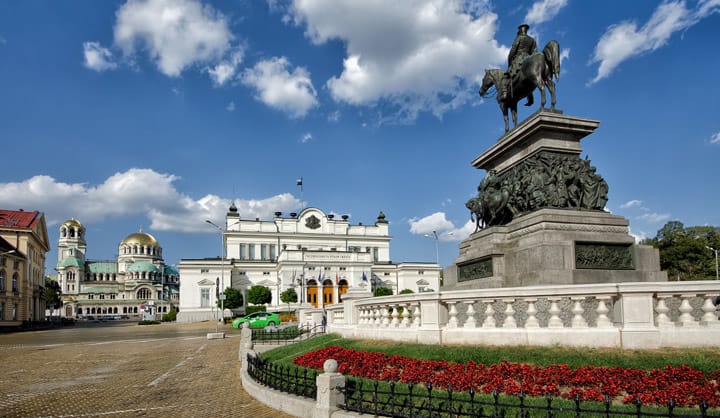
Gay Sofia · City Guide
First time in Sofia? Then our gay Sofia city guide page is for you.

Sofia | София
The capital and largest city of Bulgaria, with over 1 million people living and working here. Sofia is located in the centre of the Balkan peninsula.
With a history stretching back to antiquity, Sofia has played an important part of regional history. Occupied by the Ottomans, allied with the Nazis and set-up as a Soviet satellite state; Sofia is inviting you to discover its chequered past.
Today, you will find a bustling city that is Bulgarian's cultural, commercial, educational and political centre. Here you will find breathtaking churches, fascinating museums, beautiful boulevards, fantastic shopping opportunities and a modest gay scene.
Gay Rights in Bulgaria
Same-sex activity was legalised in 1968, however this does not by any means indicate that Bulgaria is a liberal country when it comes to sexuality. It is only since 2003 that protection against discrimination is enshrined in law and social attitudes remain conservative.
Marriage equality also may be a while away as there was a constitutional amendment in 1991 to define marriage as solely between a man and woman and in 2012 former prime minister Boyko Borisov claimed that Bulgarians weren't ready for it.
Adoption is unavailable for same-sex couples in any circumstance and surrogacy is forbidden for gay couples.
Gay Scene
Sofia, as with a lot of Eastern European cities, is lagging significantly behind your cosmopolitan gay meccas of Madrid and Berlin. It doesn't offer too much in the way of gay venues but there are a handful of Gay Bars & Clubs and Gay Saunas available.
In comparison to provincial Bulgaria, Sofia is a lot more open minded to gay couples displaying affection. It is advisable, however, to keep public displays of affection to a minimum outside of specifically gay venues.
Sofia has hosted a Pride Parade in 2008 which was met with strong opposition from religious and far-right organisations. Over time, the parade has become a lot more peaceful however the week before, religious leaders organise an anti-pride parade.
Getting to Sofia
Sofia Airport (SOF) is located 10km east of the city centre. It is Bulgaria's busiest airport and is well connected by flag carriers and budget airlines to destinations across Europe and the Middle East.
You can take Line 1 of the Sofia metro into the city centre. The journey time takes around 18 minutes and trains operate from 5.30am until midnight. The platform is located at Terminal 2 and there is free transport between terminals.
Alternatively, buses 84 and 384 run from around 5am until midnight and can be caught from Terminal 2. Journeys take between 20-40 minutes, depending on the time of day and traffic. You will have to pay extra for large items of luggage. Single tickets cost 1.60 lev on both metro and the bus.
Taxis can be taken from the airport into the city centre. The airport recommends using the official company OK Supertrans (recognised by the OK sticker). A journey into the city will cost 20 lev.

Getting around Sofia
On foot
Sofia city centre is relatively compact, so you will have no difficulty getting around on foot. Walking is also one of the best ways to take in the city's diverse architecture. It is worth bearing in mind, however, that potholes are not uncommon and there are no dedicated cyclist lanes.
By public transport
Sofia has a well-connected and -integrated public transport system of buses, trolley buses, trams and a metro service. Compared to other cities, Sofia's public transport network doesn't get too crowded at rush hour and is relatively easy to navigate at any time of day.
A single ticket costs 1 lev and day tickets cost 4 lev. You will also need a separate ticket for large items of luggage. Be sure to validate your tickets as ticket inspectors do operate and can be quite unfriendly. Services run from 5am until midnight with no night services after this time.
By taxi
Taxis are readily available in Sofia and are easily identifiable (they are yellow). Journeys inside the city centre rarely exceed 10 lev. Be wary of rogue drivers trying to imitate the official taxi companies and as a rule do not accept a taxi if approached by a driver.
Where to Stay in Sofia
Sofia has a great choice of hotels, from mid-range to luxury. For our list of recommended Sofia hotels for gay travelers, please visit our Gay Sofia Hotels page.
Things to See & Do
Alexander Nevsky Cathedral - large Bulgarian Orthodox cathedral and a fantastic example of Neo-Byzantine architecture. This is widely recognised as the symbol of Sofia.
Bulgaria National Assembly building - a monument of culture with great historic significance. Constructed between 1884 and 1886 this is a fantastic example of Neo-Renaissance architecture.
Vitoshka - Sofia's main boulevard which hosts wonderful Art Nouveau buildings and equally as grand designer brands. On a warm summers day it can feel almost Parisian.
Eagles' Bridge - named for the four eagle statues on each side of the bridge that are said to be its protectors and patrons.
Slaveykov Square - named for father and son writers Petko and Pencho Slaveykov, this is a peaceful little place to people watch. The main library is located here and you will find charming old ladies selling second hand books from stalls on the stage.
Borisova Gradina - beautiful park named after the Bulgarian Tsar Boris III. This is Sofia's oldest park with construction starting in 1882.
National Palace of Culture - striking example of communist architecture but also an important performance and exhibition venue. Hall 1 can host 3,380 people with smaller venues inside. The grounds outside are attractive and often host markets.
National Historical Museum - Bulgaria's largest museum where you can find out more about Bulgaria's fascinating history. This used to be the residence of Bulgaria's last communist leader Todor Zhivkov and is located outside of the city centre in Boyana.

When to Visit
Unlike other capital cities, Sofia doesn't get swarmed with tourists. Summer (June-August) in Sofia is very warm but generally a lot milder than other locations in the rest of Bulgaria. Winter is icy cold and there are popular ski resorts outside of the city.
Easter time is a good time to visit Sofia as celebrations and the blooming plants bring an extra level of colour to the city. Sofia film festival is also held annually in March and Sofia Pride is held every June.
Visa
Bulgaria is not part of the Schengen Zone yet although the right steps have been taken to obtain membership. Bulgaria is part of the European Union, however, and its visa requirements fall in line with what you would expect from most EU states.
Money
The currency of Bulgaria is the lev. Other currencies are not officially accepted in most venues, so it is advised to ensure you only carry Bulgarian currency.
Cash dispensers are widely available. Credit and debit cards are widely accepted
Join the Travel Gay Newsletter
Have we got something wrong?
Are we missing a new venue or has a business closed? Or has something changed and we have not yet updated our pages? Please use this form to let us know. We really appreciate your feedback.